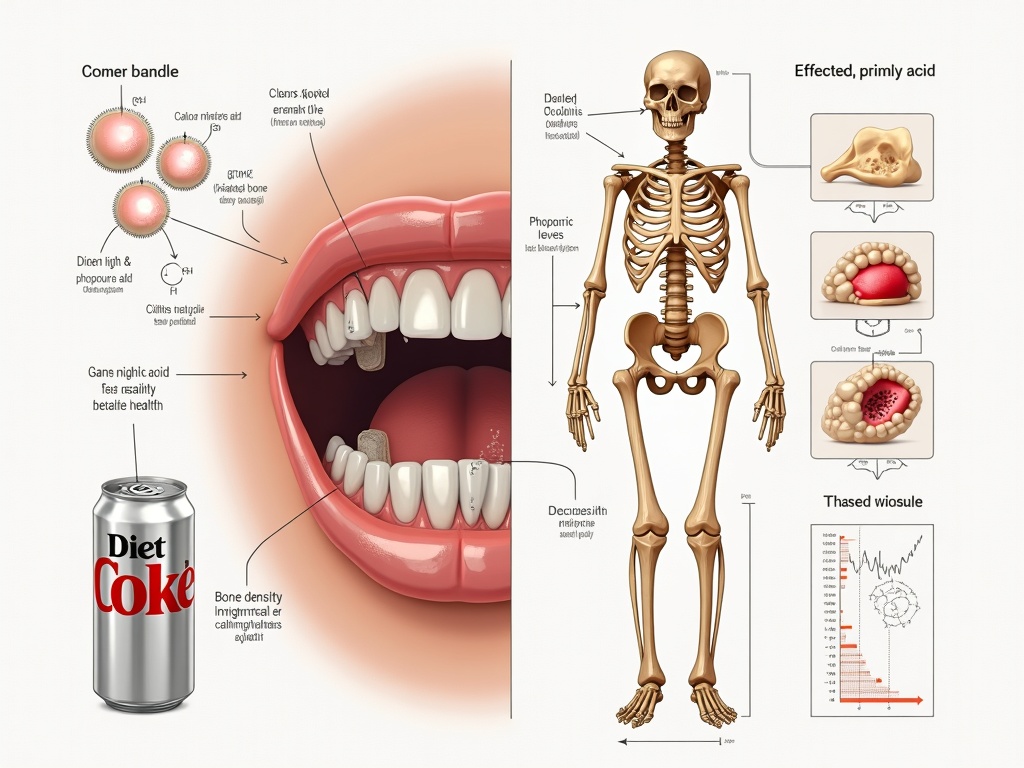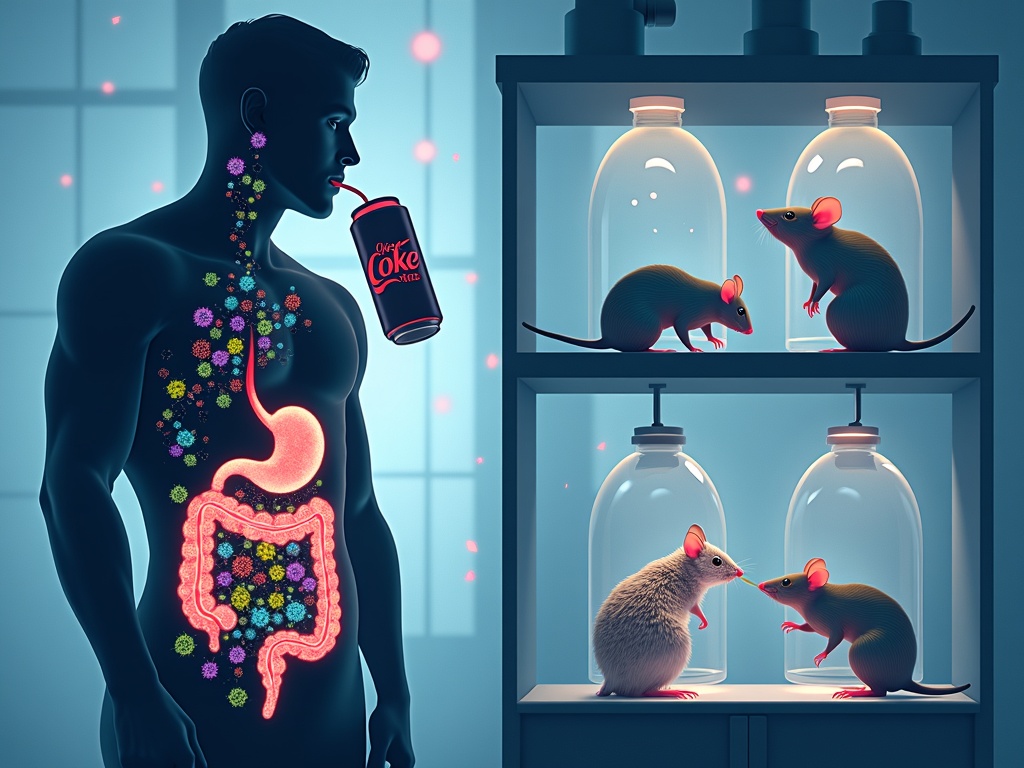No products in the cart.
Beverages News, Coca-Cola Carbonated Soft Drinks, Soft Drinks
Is Drinking Diet Coke Bad For You Or Just Hype
Is drinking Diet Coke bad for you is a question that continues to stir debate among health experts and consumers alike. Diet Coke is one of the world’s most popular zero-calorie beverages, yet recent WHO classifications of its primary sweetener, aspartame, as “possibly carcinogenic” have reignited safety concerns. While scientific evidence suggests that moderate consumption poses minimal risk for most healthy adults, issues like acidity, caffeine levels, and reliance on artificial sweeteners remain important considerations for daily drinkers.
Table of Contents
Key Takeaways
- Aspartame safety concerns are largely overblown – One would need to consume 14–19 cans daily to exceed recommended intake limits, making cancer risk negligible for typical consumption patterns.
- Acidity poses the greatest health risk – Diet Coke’s pH of 3.2 can erode tooth enamel and may contribute to bone density loss, particularly with regular consumption.
- Weight gain associations are misleading – Controlled studies show diet sodas can aid weight loss when replacing regular sodas, though observational studies suggest weight gain due to reverse causation.
- Individual responses vary significantly – People with PKU must avoid aspartame entirely, while others may experience digestive issues, headaches, or sleep disruption from caffeine and artificial sweeteners.
- Moderation is key for safety – Occasional Diet Coke consumption fits into a balanced diet for most adults, but daily heavy consumption may impact dental health, bone density, and appetite regulation.
Is Drinking Diet Coke Bad for You or Just Hype
Diet Coke stands as one of the world’s most consumed zero-calorie beverages, yet controversy surrounds its primary artificial sweetener. I’ve analyzed the latest scientific evidence to separate fact from fiction regarding this popular drink’s health implications.
The Aspartame Controversy Explained
Aspartame has sparked debate for decades, and recent developments have added fuel to the fire. In July 2023, the World Health Organization’s International Agency for Research on Cancer (IARC) classified aspartame as “possibly carcinogenic,” which sounds alarming at first glance. However, this classification means only that limited evidence suggests a potential cancer link — not that aspartame definitively causes cancer.
That same month, the WHO’s Joint FAO/WHO Expert Committee on Food Additives (JECFA) reaffirmed aspartame’s safety when consumed within normal limits. This apparent contradiction reflects different evaluation criteria: IARC assesses whether something could potentially cause cancer, while JECFA determines safe consumption levels for real-world use.
The numbers put this into perspective:
- According to the FDA, a 150-pound person would need to consume 17–19 cans of Diet Coke daily to exceed the recommended daily intake of aspartame.
- This is an unrealistic amount that far exceeds typical consumption patterns.
One legitimate concern exists for individuals with phenylketonuria (PKU), a rare genetic disorder affecting about 1 in 10,000 people. These individuals cannot properly metabolize phenylalanine, an amino acid found in aspartame. Warning labels on Diet Coke and other aspartame-containing products alert PKU patients to avoid these beverages entirely.
Diet Coke’s impact extends beyond aspartame concerns. Effects of drinking energy drinks differ from diet sodas, but both contain caffeine that can affect sleep patterns and anxiety levels in sensitive individuals. Unlike energy drinks, Diet Coke contains moderate caffeine levels comparable to coffee.
I recommend viewing Diet Coke consumption through a balanced lens:
- Occasional consumption poses minimal risk for most people.
- Excessive daily intake of any artificially sweetened beverage isn’t ideal for overall health.
What happens after drinking energy drinks shows more pronounced physiological effects than typical diet soda consumption.
The key lies in moderation and individual health considerations. If you have PKU, avoid Diet Coke completely. For others, enjoying an occasional Diet Coke as part of a balanced diet won’t likely cause harm, despite the ongoing scientific discussions about aspartame.
Diet Coke Decoded: What Science Really Says
I’ve examined the scientific evidence surrounding Diet Coke’s safety profile, and the findings might surprise you. The International Agency for Research on Cancer (IARC) recently classified aspartame, Diet Coke’s primary artificial sweetener, as “possibly carcinogenic to humans.” However, this classification reflects limited evidence rather than conclusive proof of harm.
The IARC’s classification system often confuses consumers because it places aspartame in the same category as everyday items like aloe vera extract and pickled vegetables. This classification focuses on hazard identification rather than actual risk assessment, which means it doesn’t consider how much you’d need to consume to experience potential effects.
Real-World Safety Assessment
The Joint Expert Committee on Food Additives (JECFA) provides a more practical perspective on aspartame safety. This organization evaluates real-world consumption patterns and has consistently found that aspartame remains safe when consumed within acceptable daily intake limits. For context, you’d need to drink approximately 14 cans of Diet Coke daily to approach these safety thresholds, assuming you’re an average-weight adult.
Multiple comprehensive scientific reviews support these findings. Most research concludes that moderate consumption of aspartame or Diet Coke poses minimal risk for the general adult population. The European Food Safety Authority, FDA, and other regulatory bodies worldwide have reached similar conclusions after reviewing decades of safety data.
Energy drink ingredients often face similar scrutiny, yet regulatory agencies consistently find that moderate consumption falls within safe parameters. The key lies in understanding that the dose makes the poison – a principle that applies to virtually every substance we consume.
I find it important to note that certain populations should exercise additional caution:
- People with phenylketonuria (PKU) must avoid aspartame entirely due to their inability to process phenylalanine, one of aspartame’s breakdown products.
- Pregnant women might also want to limit artificial sweetener intake, though current evidence doesn’t suggest complete avoidance is necessary.
The broader health implications of Diet Coke consumption extend beyond aspartame concerns. Some studies suggest potential links between artificial sweeteners and changes in gut bacteria, though researchers haven’t established definitive causal relationships. Other research indicates possible associations with headaches in sensitive individuals, but these effects vary significantly between people.
I’ve observed that much of the anxiety surrounding Diet Coke stems from a misunderstanding of scientific classification systems. When drinking energy drinks or diet sodas becomes a daily habit, moderation becomes crucial regardless of specific ingredient concerns.
The caffeine content in Diet Coke – approximately 34mg per 12-ounce can – presents minimal risk for most adults when consumed as part of a balanced diet. This amount is significantly lower than what you’d find in a typical cup of coffee or many energy beverages.
Current scientific consensus suggests that occasional Diet Coke consumption poses little risk to healthy adults. The evidence doesn’t support claims that moderate intake causes cancer, significant metabolic disruption, or other serious health consequences. However, like any processed beverage, Diet Coke shouldn’t replace water as your primary hydration source.
I recommend focusing on overall dietary patterns rather than fixating on individual ingredients. If you enjoy Diet Coke occasionally and maintain a balanced diet rich in whole foods, the scientific evidence suggests you can continue doing so without significant health concerns. The effects of drinking energy drinks or diet sodas become problematic primarily when consumption becomes excessive or replaces nutritious food choices.
Remember that individual responses to artificial sweeteners can vary. Some people report digestive discomfort or headaches from aspartame, while others experience no adverse effects. Pay attention to your body’s signals and adjust your consumption accordingly. The science supports moderate Diet Coke consumption as part of a varied diet for most healthy adults.
The Real Culprit: Acidity and Your Body
I need to address what might be Diet Coke’s most damaging characteristic: its extreme acidity. With a pH of approximately 3.2, Diet Coke sits firmly in the acidic range, comparable to vinegar. This level of acidity creates serious concerns for your teeth and bones that extend far beyond any artificial sweetener debates.
How Acid Attacks Your Teeth and Bones
Diet Coke contains both phosphoric and citric acid, creating a double assault on your tooth enamel. These acids work continuously to soften and erode the protective coating on your teeth every time you take a sip. Regular exposure to this acidic environment weakens enamel over time, making teeth more susceptible to decay and sensitivity.
Your bones face similar threats from frequent Diet Coke consumption. The Framingham Osteoporosis Study revealed alarming findings about cola drinkers specifically. Individuals who consumed cola daily showed approximately 4% lower hip bone density compared to those who avoided cola entirely. What makes this particularly concerning is that researchers found this bone density reduction only occurred with cola consumption—other carbonated drinks didn’t produce the same effect.
The high phosphorus content in Diet Coke disrupts your body’s delicate calcium balance. Your body requires a specific ratio of calcium to phosphorus for optimal bone health. When you consume excessive phosphorus from frequent cola drinking, it can interfere with calcium absorption and potentially lead to calcium being pulled from your bones to maintain proper blood levels.
This calcium disruption becomes more problematic with age, when bone density naturally begins to decline. Regular Diet Coke consumption during these critical years could accelerate bone loss and increase fracture risk later in life. The effects of drinking energy drinks show similar patterns with highly acidic beverages.
I recommend limiting Diet Coke consumption and following these strategies:
- Use a straw when drinking to minimize contact with your teeth.
- Rinse your mouth with water after consuming Diet Coke to help neutralize acids.
- Wait 30–60 minutes after drinking before brushing your teeth to avoid damaging softened enamel.
Understanding these acidic effects helps you make informed decisions about your beverage choices and implement protective strategies when you do choose to enjoy Diet Coke occasionally.

What’s Inside a Can: Ingredient Breakdown
I’ll walk you through exactly what goes into each can of Diet Coke to help you understand what you’re consuming. The ingredient list includes carbonated water as the base, along with caramel color for that distinctive dark appearance, aspartame as the primary sweetener, phosphoric acid for tartness, potassium benzoate as a preservative, natural flavors for taste, citric acid for additional flavor enhancement, and caffeine for that energy boost.
Caffeine Content and Comparisons
A standard 12-ounce can delivers approximately 46 mg of caffeine, which puts it in an interesting position compared to other popular beverages. This amount exceeds regular Coke’s 34 mg but falls well below a typical cup of coffee at 95 mg. When compared to energy drinks like Red Bull, which contains 80 mg per 8.4-ounce can, Diet Coke provides a moderate caffeine boost that won’t overwhelm most people’s daily intake limits.
The aspartame content reaches 180–200 mg per can, making it roughly 200 times sweeter than regular sugar. This artificial sweetener allows manufacturers to achieve the sweet taste without adding calories, though it remains one of the most debated ingredients in diet sodas.
Caramel coloring gives Diet Coke its signature brown appearance, but this ingredient contains a compound called 4-MEI (4-methylimidazole) as a byproduct of the manufacturing process. The FDA has evaluated this substance and determined it’s safe at current exposure levels found in food products. However, some health advocates continue to raise questions about long-term consumption effects.
Potassium benzoate serves as the primary preservative, preventing bacterial and fungal growth to extend shelf life. This compound forms when potassium and benzoic acid combine, creating an effective preservation system that’s widely used across the food industry.
Phosphoric acid contributes to Diet Coke’s tangy flavor profile while also acting as a preservative. This ingredient has raised concerns among some health professionals due to potential effects on bone health, particularly with regular consumption over extended periods.
The natural flavors component remains somewhat mysterious, as companies aren’t required to disclose specific flavor compounds. These ingredients create Diet Coke’s distinctive taste profile that differs from regular Coke and other cola brands.
Understanding these ingredients helps you make informed decisions about your beverage choices. While each component has received FDA approval for food use, individual reactions can vary, and consumption patterns matter significantly. Just like with energy drinks, moderation remains key when incorporating any caffeinated or artificially sweetened beverage into your routine.
The ingredient combination creates a complex flavor profile that millions enjoy daily, but knowing what’s inside empowers you to balance Diet Coke consumption with your overall health goals and dietary preferences.
The Paradox: Zero Calories and Weight Gain
I find it fascinating how diet sodas promise zero calories yet many studies suggest they’re linked to weight gain. This contradiction puzzles both researchers and consumers alike.
The Research Reality
The University of Texas conducted a compelling study that tracked diet soda drinkers for a decade. People who consumed diet sodas experienced a 70% greater increase in waist circumference over 10 years compared to non-drinkers. Heavy users faced an even more dramatic outcome—a 500% greater rise in waist size. These numbers certainly grab attention, but we need to dig deeper into what they actually mean.
Reverse causation likely plays a significant role in these findings. People who are already struggling with weight issues often turn to diet beverages as a healthier alternative to regular sodas. They’re not gaining weight because of diet sodas—they’re choosing diet sodas because they’re already gaining weight. This chicken-and-egg scenario makes it difficult to establish direct causation.
The Controlled Trial Evidence
Randomized controlled trials paint a very different picture. When researchers directly compare groups switching from regular to diet sodas, the diet soda group typically shows weight loss benefits. These controlled studies eliminate many confounding factors that observational research can’t account for.
However, artificial sweeteners may create their own challenges. These sugar substitutes can interfere with your brain’s natural ability to associate sweetness with actual calorie intake. Your brain expects calories when it tastes something sweet, and when those calories don’t arrive, it might trigger compensatory behaviors. This disruption could lead to increased cravings or overeating later in the day.
The sweetener confusion doesn’t stop there. Some people report that drinking diet sodas makes them crave more sweet foods throughout the day. While this isn’t universal, it’s worth considering if you notice similar patterns in your own eating habits after consuming artificially sweetened beverages.
I think the key lies in understanding that diet sodas aren’t magic weight-loss tools. They’re simply beverages with fewer calories than their regular counterparts.
- If you replace a 150-calorie regular soda with a zero-calorie diet version daily, you’ll create a caloric deficit.
- But if you compensate by eating more food elsewhere, you won’t see weight loss benefits.
The effects of drinking any beverage depend largely on your overall dietary pattern and lifestyle choices.

The Gut Factor: Diet Coke and Your Microbiome
Your gut bacteria play a crucial role in digestion, immunity, and overall health. Recent research has raised questions about how artificial sweeteners in Diet Coke might affect this delicate bacterial ecosystem.
Scientists have discovered that artificial sweeteners don’t just pass through your body unchanged. A groundbreaking 2014 study in Nature revealed that aspartame, the primary sweetener in Diet Coke, significantly altered gut bacteria in laboratory mice. The researchers found that these changes led to glucose intolerance, essentially making the mice less able to process sugar effectively.
What made this study particularly compelling was its next phase. When researchers transferred gut bacteria from aspartame-treated mice to sterile mice through fecal transplants, the recipient mice also developed glucose intolerance. This suggests that the sweetener’s effects on gut bacteria were directly responsible for the metabolic changes.
Human Studies Paint a Different Picture
While animal studies provide valuable insights, human research tells a more complex story. I’ve reviewed multiple studies examining how artificial sweeteners affect health, and the results remain frustratingly mixed.
Several human trials have attempted to replicate the mouse findings, but results vary significantly. Some participants showed changes in gut bacteria composition after consuming artificial sweeteners, while others experienced no measurable effects. Individual differences in existing gut bacteria, genetics, and lifestyle factors all seem to influence how people respond to these sweeteners.
The challenge lies in study design and duration. Most human studies on this topic have been relatively short-term, lasting weeks rather than months or years. Your gut microbiome is incredibly complex, containing trillions of bacteria across hundreds of species. Understanding how Diet Coke consumption affects this system over time requires longer observation periods.
Additionally, many people who drink Diet Coke regularly have different dietary patterns and health behaviors compared to those who don’t. These confounding factors make it difficult to isolate the specific effects of artificial sweeteners on gut health.
Current evidence suggests that moderate Diet Coke consumption may not dramatically disrupt your gut microbiome, but individual responses can vary. If you’re concerned about gut health, consider monitoring how you feel after consuming diet sodas. Some people report digestive discomfort or changes in bowel habits when consuming artificial sweeteners regularly.
The relationship between artificial sweeteners and gut bacteria remains an active area of research. Until scientists conduct more comprehensive long-term human studies, I recommend treating Diet Coke like any processed food product — fine in moderation, but not something to consume in large quantities daily.

Hidden Health Effects Beyond Teeth and Weight
I’ve reviewed emerging research that reveals Diet Coke’s potential impact extends far beyond dental health and weight management concerns. Studies suggest artificially sweetened beverages may carry neurological risks that deserve serious consideration.
Neurological Risks and Cognitive Impact
Research indicates a concerning connection between artificial sweeteners and brain health. Studies have found potential links between regular consumption of artificially sweetened drinks like Diet Coke and increased stroke risk. Even more troubling, some research suggests a possible association with dementia development over time.
I find these neurological findings particularly significant because they affect cognitive function directly. The mechanisms behind these potential risks aren’t fully understood, but the correlation appears strong enough to warrant caution. Your brain’s response to artificial sweeteners may differ substantially from its reaction to natural sugars, potentially triggering unexpected physiological responses.
Behavioral and Genetic Influences
Diet Coke’s sweet taste without calories creates an interesting behavioral paradox. I’ve observed that consuming intensely sweet flavors without corresponding energy can subtly alter eating patterns. Your brain expects calories when it tastes sweetness, and this mismatch might influence future food choices in unexpected ways.
Genetic factors play a crucial role in how your body processes artificial sweeteners. Some people metabolize these compounds differently, leading to varied reactions ranging from digestive issues to mood changes. This genetic variability explains why Diet Coke affects individuals so differently—what seems harmless for one person might cause problems for another.
The relationship between energy drink consumption and artificial sweeteners shares similar concerns, as both involve synthetic compounds with unclear long-term effects.
Current research remains ongoing, with scientists still investigating the full scope of daily Diet Coke consumption’s impact. Long-term studies require decades to complete, leaving gaps in our understanding of chronic exposure effects. I recommend treating these beverages as occasional treats rather than daily staples.
Most health experts advocate moderation as the safest approach. Rather than complete elimination, limiting Diet Coke to occasional consumption appears to be the most practical strategy for minimizing potential risks while still allowing dietary flexibility. This balanced approach acknowledges both the convenience these beverages offer and the legitimate health concerns they may pose.
Is Drinking Diet Coke Bad for You? The Direct Answer
I’ll give you the straightforward answer: Diet Coke isn’t inherently dangerous for most healthy adults when consumed occasionally. The key word here is moderation. While social media and health blogs often paint diet sodas as toxic villains, the scientific reality is more balanced.
The Real Health Concerns You Should Know
Three main factors make Diet Coke potentially problematic for your health:
- Acidity: Its acidic pH can erode tooth enamel over time, especially if you sip it slowly or frequently.
- Caffeine content: Each 12-ounce can contains about 46 milligrams of caffeine, which can contribute to anxiety, sleep disruption, or dependency with overconsumption.
- Artificial sweeteners: Ingredients like aspartame may affect your appetite regulation and gut bacteria, although research remains mixed on long-term effects.
Heavy consumption — defined as drinking multiple cans daily — brings more pronounced risks:
- Dental health deterioration: Enamel erosion can lead to cavities and sensitivity.
- Bone health: Some studies suggest regular diet soda consumption might impact bone density, particularly in women. However, the connection is not definitively proven.
- Appetite fluctuations: Artificial sweeteners might stimulate cravings for sweet foods, potentially impacting weight management.
Who Should Exercise Extra Caution
Certain groups should be more cautious about consuming Diet Coke:
- Children: Their developing bodies are more sensitive to caffeine.
- Pregnant women: Should monitor caffeine intake from all sources, including diet sodas.
- People with PKU: Must avoid aspartame, which contains phenylalanine that they can’t metabolize properly.
Additionally, those with existing health conditions such as heart problems, anxiety disorders, or digestive issues should tread carefully. The caffeine and artificial ingredients may exacerbate these issues. The same applies to people taking medications that interact with caffeine or those particularly sensitive to artificial sweeteners.
Much like how people question Red Bull’s health effects, Diet Coke concerns often stem from misunderstanding the difference between occasional use and excessive intake. An occasional Diet Coke with lunch won’t derail your health goals, but replacing water entirely with diet soda has clear drawbacks.
I recommend treating Diet Coke as an occasional treat rather than a daily beverage. If you’re currently drinking several cans daily, consider gradually reducing your intake to avoid caffeine withdrawal symptoms such as headaches. Monitor how your body responds—some individuals experience digestive upset, headaches, or sleep disruptions even with moderate consumption.
The bottom line is that Diet Coke isn’t the health destroyer that some claim it to be, but it’s not a health food either. Your overall diet quality, exercise habits, and lifestyle choices have far greater impacts on your wellbeing than whether you enjoy a diet soda every now and then.
Focus on drinking plenty of water, eating nutritious foods, and treating Diet Coke for what it is—a caffeinated, artificially sweetened beverage that can fit into a balanced lifestyle when consumed mindfully.
Sources:
World Health Organization: “Aspartame hazard and risk assessment results released”
U.S. FDA: “High-Intensity Sweeteners Permitted for Use in Food in the U.S.”
University of Texas Health Science Center: “Artificially Sweetened Beverage Use and Long-term Weight Gain”
Nature: “Artificial sweeteners induce glucose intolerance by altering the gut microbiota”
The American Journal of Clinical Nutrition: “Colas and bone mineral density in older women”
Stroke Journal: “Sugary and Artificially Sweetened Beverages and Risks of Stroke and Dementia”


